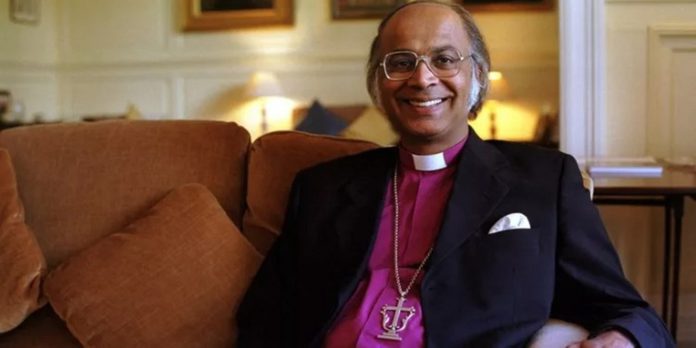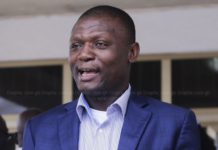
A former Bishop of Rochester, Dr Michael Nazir-Ali, was received into the Roman Catholic Church last month, the Personal Ordinariate of Our Lady of Walsingham announced on Thursday.
“With the permission of the Holy See, he will be ordained to the Catholic priesthood for the Ordinariate in due course,” the announcement said.
Dr Nazir-Ali, who was ordained in the Church of England in 1974, described his move as “a further step in the ministry of our common Lord and of his people”.
He said: “I believe that the Anglican desire to adhere to apostolic, patristic and conciliar teaching can now best be maintained in the Ordinariate. Provisions there to safeguard legitimate Anglican patrimony are very encouraging and, I believe, that such patrimony in its liturgy, approaches to biblical study, pastoral commitment to the community, methods of moral theology and much else besides has a great deal to offer the wider Church.
“I am looking forward to receiving from the riches of other parts of the Church, while perhaps making a modest contribution to the maintenance and enhancement of Anglican patrimony within the wider fellowship.
“Ministry in the Church of Pakistan, in the Middle East generally, in the Church of England and the wider Anglican Communion remains precious to me and I see this as a further step in the ministry of our common Lord and of his people. At this time, I ask for prayers as I continue to pray for all parts of the Church.”
Dr Nazir-Ali was received by Mgr Keith Newton, the Ordinariate’s Ordinary, on 29 September. He brought “a great experience of the Anglican Communion and is in a unique place to articulate that Anglican patrimony, described by Pope Benedict XVI as a treasure to be shared, which now has an honoured place in the Universal Church”, Mgr Newton said.
Born in Pakistan in 1949, Dr Nazir-Ali has both a Christian and Muslim family background: his father was a convert from Islam and his mother was a Methodist.
In 2002, speculation about his potential to succeed Lord Carey as Archbishop of Canterbury alighted on his connection to the RC Church: he attended RC schools in Pakistan before being received into the Church of Pakistan around his 20th birthday (News, 17 May 2002).
He told The Daily Telegraph: “These are labels and they don’t really mean anything . . . I try to be a rounded Christian.”
After an initial curacy at Holy Sepulchre and All Saints’, Cambridge (1974-76), he served in both Pakistan and England. He was Bishop of Raiwind from 1984 until 1986, leaving after harassment escalated to threats against his children.
He was General Secretary of CMS from 1989 until 1994, serving as an assistant bishop in Southwark diocese, before being appointed Bishop of Rochester.
He was the first Anglican bishop of BAME heritage to head an English diocese. He resigned in 2009, speaking of a desire to focus on a new global ministry in places where the Church was under pressure (News, 3 April 2009).
He was a member of the second Anglican-Roman Catholic International Commission (1983 to 2005) and also of the International Anglican-Roman Catholic Commission for Unity and Mission.
Responding to speculation in 2009 that he might join the Ordinariate, his spokesman said that he intended “to continue as a bishop in the Church of England and to encourage orthodox people, Evangelical and Catholic, in the worldwide Anglican Communion”.
He sought “principled unity based on the Bible and theological agreement between the Anglican and Roman Catholic Churches” (News, 30 October, 2009).
Addressing Forward in Faith’s National Assembly that year, he welcomed “the fact that for the first time, in relating to an ecclesial body of Western origin, the Roman Catholic Church is prepared to make the sorts of provisions that it is prepared to make” before setting out a number of questions about how it might work in practice.
ARCIC and its work had been “shot to pieces by developments in the Anglican Communion in the past 20 years”, he said (News, 30 October 2009).
As secretary of the Archbishops’ Commission on Communion and Women in the Episcopate, he wrote of women’s ministry in 1992: “If the logic of the gospel’s teaching on equality has led Christians to see that slavery is untenable, does not the same logic lead us to ask whether distinctions in the Church based on gender are also untenable?” (News, 11 September 1992).
His “Rochester report” for the General Synod, Women Bishops in the Church of England, suggested that the Church of England’s first woman bishop could be ordained in five years’ time (News, 5 November 2004).
His suggestion of single-clause legislation accompanied by a binding Code of Practice proved prescient (News, 18 February 2005), although a Measure was not passed until 2014.
Conservative on matters of sexuality, he was the only diocesan bishop of the Church of England to boycott the 2008 Lambeth Conference (News, 27 July 2008), having helped to organise the 1988 gathering.
He commented: “I would find it difficult to be in a eucharistic gathering around the Lord’s table with people who have, again and again, said no to the Church’s request not to do something that is contrary to the Bible and the unanimous teaching of the Church down the ages.”
He went on to ally himself with GAFCON (News, 4 July 2008).
Currently president of the Oxford Centre for Training, Research, Advocacy and Dialogue, which seeks to “prepare Christians for ministry in situations where the Church is under pressure and in danger of persecution”, he has taught at a number of institutions and written books, several of which explore Christian-Muslim relations.
The Ordinariate was established in 2011 after Pope Benedict XVI issued an Apostolic Constitution noting that “the Holy Spirit has moved groups of Anglicans to petition repeatedly and insistently to be received into full Catholic communion individually as well as corporately” (News, 23 October 2009).
In 2011, three serving bishops of the C of E — those of Fulham, Ebbsfleet, and Richborough — were received and reordained by Archbishop Vincent Nichols (News, 6 January 2011). During Holy Week of that year, almost 1000 men, women and young people were received (News, 29 April 2011). Since then, more than 80 former Anglican priests have joined the Ordinariate. Most are now serving as deacons and priests in the RC Church.
In a statement on Thursday, the Archbishop of Canterbury, the Most Revd Justin Welby, said: “I am grateful for Michael Nazir-Ali’s decades of devoted service to the Church of England and the Anglican Communion. His expertise in evangelism, interfaith dialogue, ecumenism, and theological education has been a great gift.
“He will continue to be a blessing to the global church as he joins the ordinariate. I will be praying for him and his wife, Valerie, that this new step in their journey might draw them ever closer to God in Christ.”
The Archbishop of the Anglican Church in North America, the Most Revd Foley Beach, who chairs the GAFCON Primates’ Council, said that Dr Nazir-Ali had “shared with me his willingness to continue to assist the Gafcon movement in any way that might be suitable. While we are still exploring what this might look like, in the near term we look forward to continuing to partner with him in support of the suffering church.”
Dr Nazir-Ali told The Daily Telegraph this week that he felt “sad” about leaving Anglicanism behind, and that he had been considering the move “for some years”.
He spoke of “a lack of teaching authority in Anglicanism, a lack of a sense of belonging to a worldwide church where everyone has to do things in step, rather than everyone doing whatever they want to do”.

